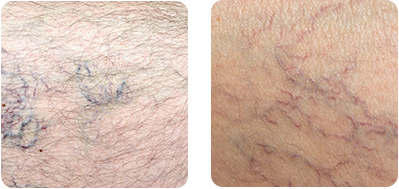Spider veins in pregnancy: Annoying but fairly common
When you decide to get pregnant, your thoughts are mostly of the smiling cherub that you will have at the end of nine months. Or maybe the extra attention you will end up getting. Unfortunately, pregnancy has its darker side too – the nausea, the fatigue, the stretch marks, and… the spider veins. “You’ll get through it, it’s only nine months” is a phrase that you will be hearing really often. While we don’t have that magic wand handy to vanish these issues, we can help you with preventing and managing spider veins.

So why do you get spider veins during pregnancy?
When you are pregnant, the volume of blood in your body increases. Your hormones, which are at all all-time high, along with the extra blood put pressure on the walls of your blood vessels, causing them to expand. Your weight gain and expanding uterus also compresses a major blood vessel in your pelvis, called the inferior vena cava. This vessel collects the blood from the legs and transfers it to the heart. When it gets compressed, the blood in the leg veins backs up, increasing the pressure even further. The abnormally high pressure can force the blood out of the enlarged veins, and even form new, unhealthy, tiny vessels. These are reddish or bluish, and have the characteristic spider like appearance that gives spider veins their name.
Can you prevent spider veins from forming during your pregnancy?
Yes! If you learn ways to decrease the pressure of blood in your leg veins, you may be able to prevent the appearance of spider veins. The following methods should help you achieve this:
- Exercise regularly: If you are on the move, your leg muscles will keep pumping blood back to your heart, which helps keep the pressure low. Walking is a good idea, and has a whole host of other benefits as well.
- Take Vitamin C supplements: Vitamin C helps build collagen and elastin, two key proteins that maintain the integrity of the blood vessel walls and strengthen them.
- Keep your feet up: Elevating your legs can help drain blood from them to your heart. Try putting your feet up on a pillow whenever you sit or lie down.
- Sleep on your left side: Sleeping on your left side takes the pressure off your inferior vena cava, allowing the blocked blood to flow back to the heart.
- Avoid crossing your legs and wearing high heels: Crossing your legs can increase the pressure in leg veins and worsen the appearance of spider veins. The same occurs when you wear high heels. You probably won’t be able to cross your legs anyway towards the end of pregnancy, but stick to wearing low heeled, sensible shoes – your tired, swollen ankles will thank you.
- Get on a bowel-friendly diet: Constipation is another one of those nasty pregnancy symptoms. When you strain, the deep blood vessels in your leg get compressed, and more blood gets forced towards the superficial ones, worsening the problem of spider veins. So prevent constipation by getting plenty of fiber in your diet, and drinking lots of water.
Okay, you have some spider veins. Should you get them treated during your pregnancy?
If your spider veins don’t really bother you, you can leave them alone for the duration of your pregnancy. If you do notice the following features, though, it may be time to visit a vein doctor.
- Your spider veins are painful, swollen or tender.
- There is reddish discolouration of the skin around the spider veins
- There is bleeding from the spider veins.
The above may signal a deeper problem, like varicose veins, or chronic venous insufficiency. These conditions must be evaluated for severity by a board certified vein specialist.
During pregnancy, your vein doctor may have you fitted for compression hose/ compression stockings. These stockings will massage your legs and pump up the blood circulation, and will reduce your symptoms. The spider veins themselves will most probably disappear around three months after childbirth. If they don’t go away, you can consider visiting your vein doctor again, who might offer you one or more of the following forms of treatment:
- Sclerotherapy injections
This is the commonest and most effective way to remove your spider veins. Your vein injects a special medicated solution into the vein. This causes the vein walls to scar, stick together and seal off from within. It eventually gets absorbed by the body and disappears. You can start to see results within a week of treatment.
- Varithena
This is an advanced form of sclerotherapy that is employed for slightly larger forms of spider veins. This involves injecting foam into your veins, which will cause scarring and sealing.
- Laser treatment
Laser energy is applied to the skin directly over your spider veins. This energy destroys the veins and eliminates them. This method is preferred when the veins are really small and difficult to subject to injections. This works better in combination with sclerotherapy, and is generally done to eliminate the last few veins after sclerotherapy has already been done. The results of laser treatment may take a few months.
Of course, the decision of whether or not your spider veins need treatment, and the best method of treatment must only be made in consultation with a vein specialist. You can meet with our exemplary vein doctors in New York, New Jersey and San Diego at The Vein Treatment Clinic. The vein doctors at VTC are particularly skilled at dealing with varicose veins and spider veins that arise during pregnancy. VTC is part of VIP Medical Group, a healthcare enterprise dedicated to healing vein diseases and offering pain solutions. So if you need to get rid of your pregnancy spider veins, choose your convenient location and give us a call today!







